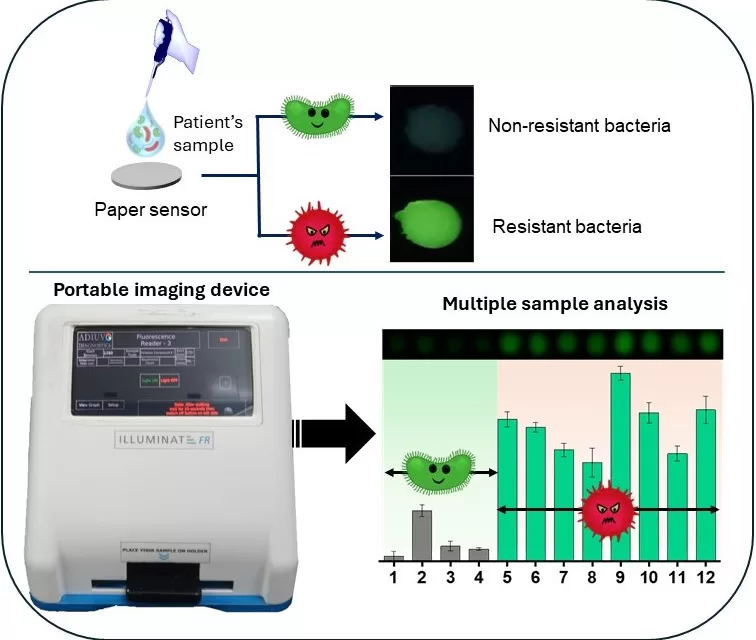February 16, 2024
Researchers from the Indian Institute of Science (IISc) and Jawaharlal Nehru Centre for Advanced Scientific Research (JNCASR) have introduced a novel paper-based platform designed to swiftly detect the presence of antibiotic-resistant bacteria, potentially revolutionizing diagnostic processes for infectious diseases.
The emergence of antibiotic-resistant bacteria poses a significant global health threat, leading to millions of deaths annually. Prompt diagnosis is crucial for effective treatment, yet current methods often entail time-consuming processes that delay targeted interventions.
Published in ACS Sensors, the paper outlines a rapid diagnosis protocol utilizing a luminescent paper-based platform capable of detecting antibiotic-resistant bacteria. Led by Professor Uday Maitra from the Department of Organic Chemistry at IISc, the interdisciplinary team aimed to address the urgent need for expedited diagnostics in the face of antibiotic resistance.
The platform leverages a supramolecular hydrogel matrix containing biphenyl-4-carboxylic acid (BCA) and terbium cholate (TbCh). This hydrogel emits green fluorescence under UV light, serving as an indicator for the presence of antibiotic-resistant bacteria. Through a sophisticated enzyme-substrate interaction, the hydrogel responds to the activity of β-lactamase, an enzyme produced by resistant bacteria, leading to the emission of green fluorescence.
Arnab Dutta, lead author of the paper and a PhD student at IISc, explains the mechanism: “In the presence of β-lactamase enzyme, the gel will produce green emission. β-lactamase enzyme in the bacteria is the one that cuts open the drug, destroys, and unmasks the sensitiser BCA. So, the presence of β-lactamase is signalled by green emission.”
The team collaborated with Adiuvo Diagnostics, a Tamil Nadu-based company, to develop a custom portable imaging device named Illuminate Fluorescence Reader. This miniature device incorporates UV radiation and a built-in camera to capture green fluorescence signals emitted by the hydrogel. A dedicated software app measures the intensity of the fluorescence, enabling the quantification of bacterial load.
The innovation significantly reduces diagnostic costs compared to traditional methods, as the paper-based platform offers a cost-effective alternative. Moreover, its portability and ease of use make it suitable for deployment in various healthcare settings.
To validate the effectiveness of their approach, the researchers conducted tests on urine samples, successfully detecting pathogenic bacteria within two hours. Plans are underway to collaborate with hospitals for further validation using patient samples.
The development of this paper-based platform marks a significant advancement in the fight against antibiotic-resistant bacteria, offering a promising tool for rapid and accurate diagnostics in infectious disease management.
As the team prepares for clinical testing, their groundbreaking research holds the potential to transform healthcare practices, ensuring timely interventions and improved outcomes for patients worldwide.
The full study published in ACS Sensors provides detailed insights into the innovative technology and its applications in combating antibiotic resistance.












